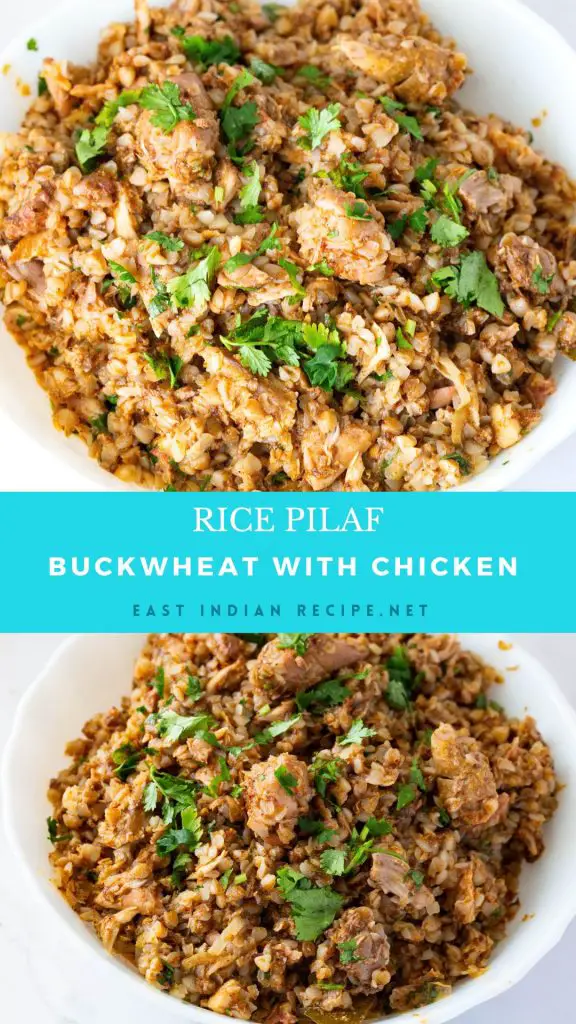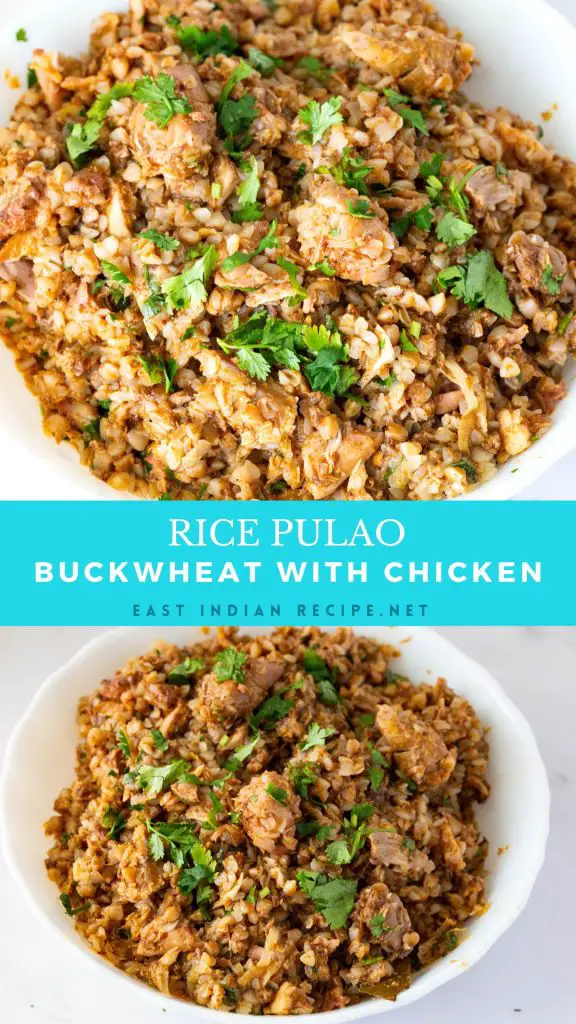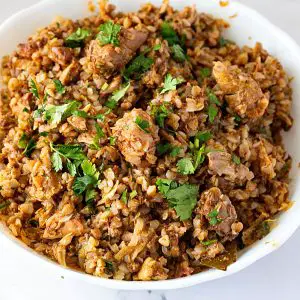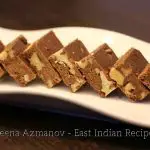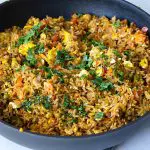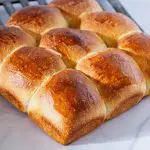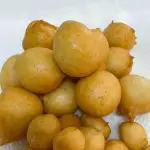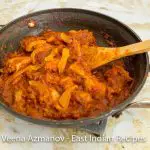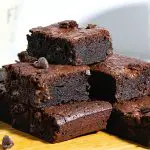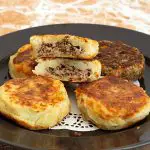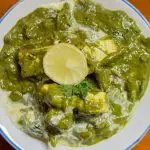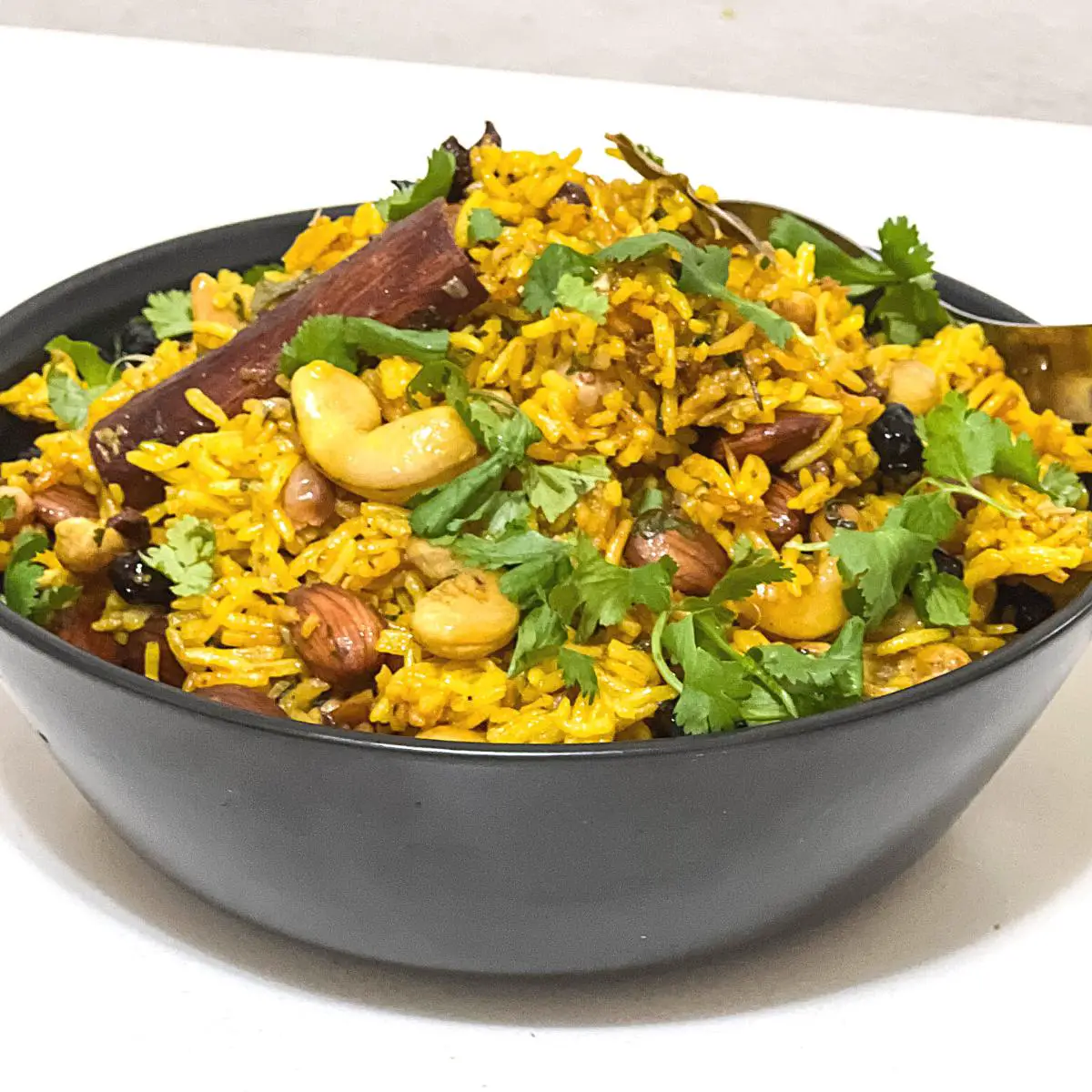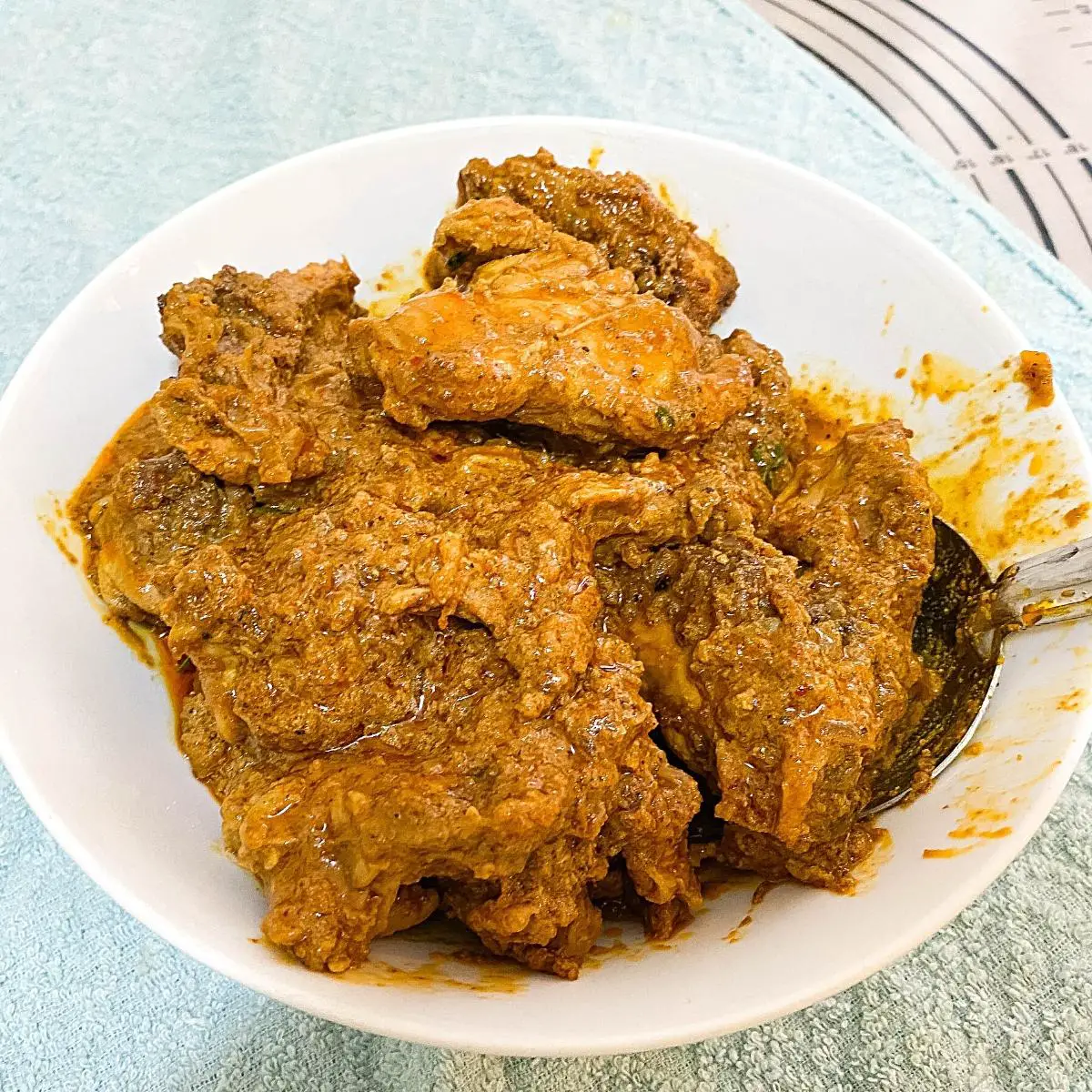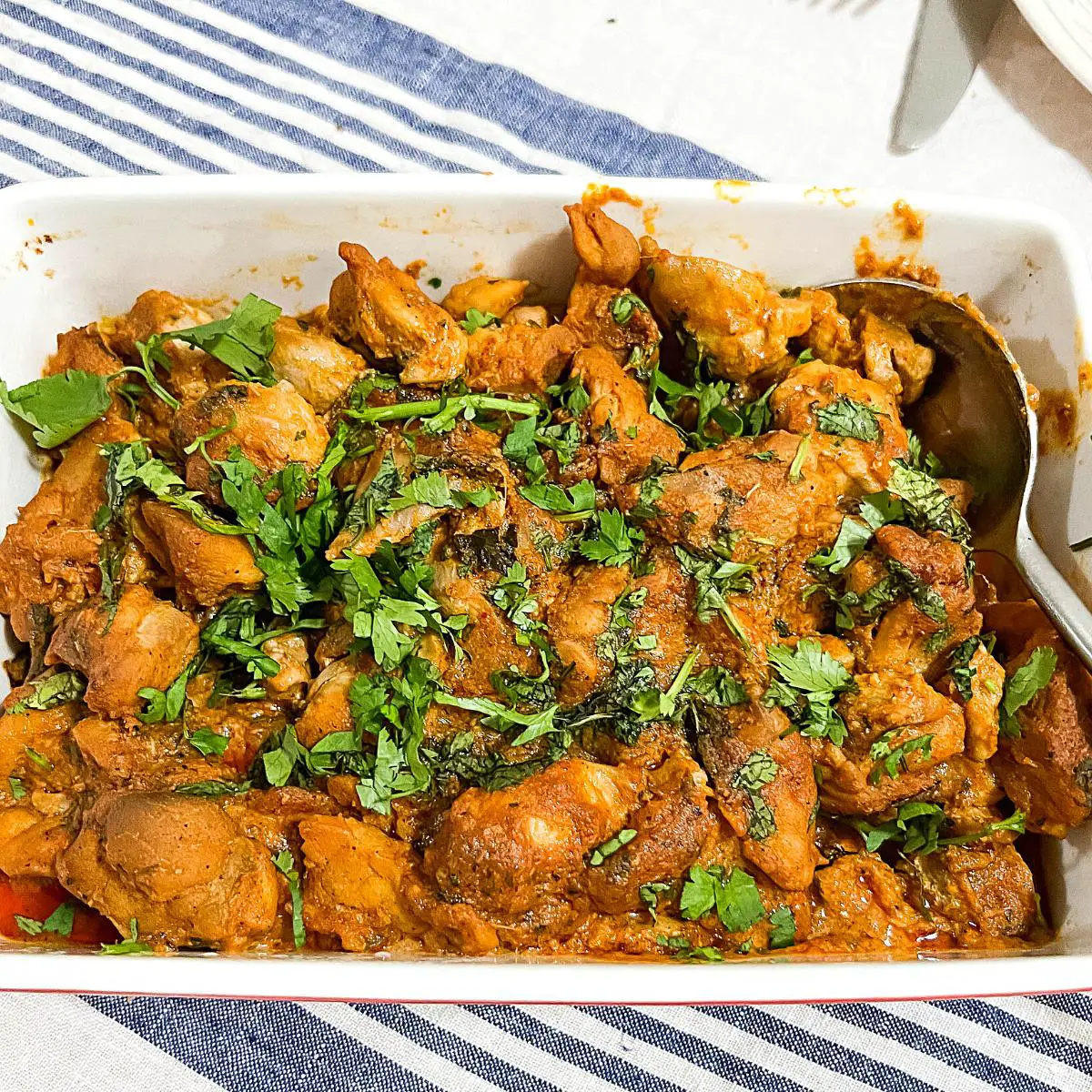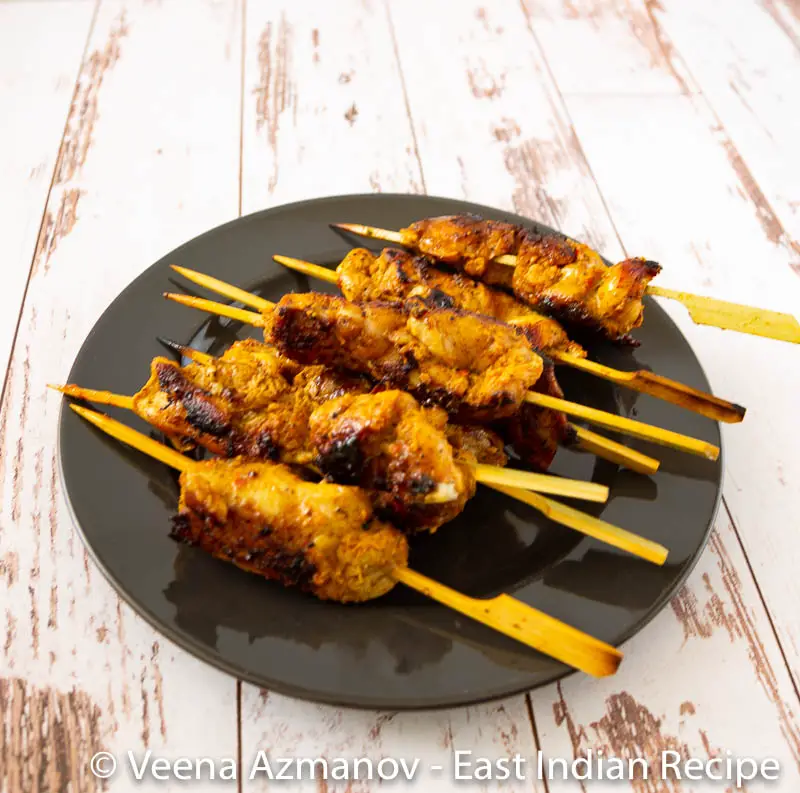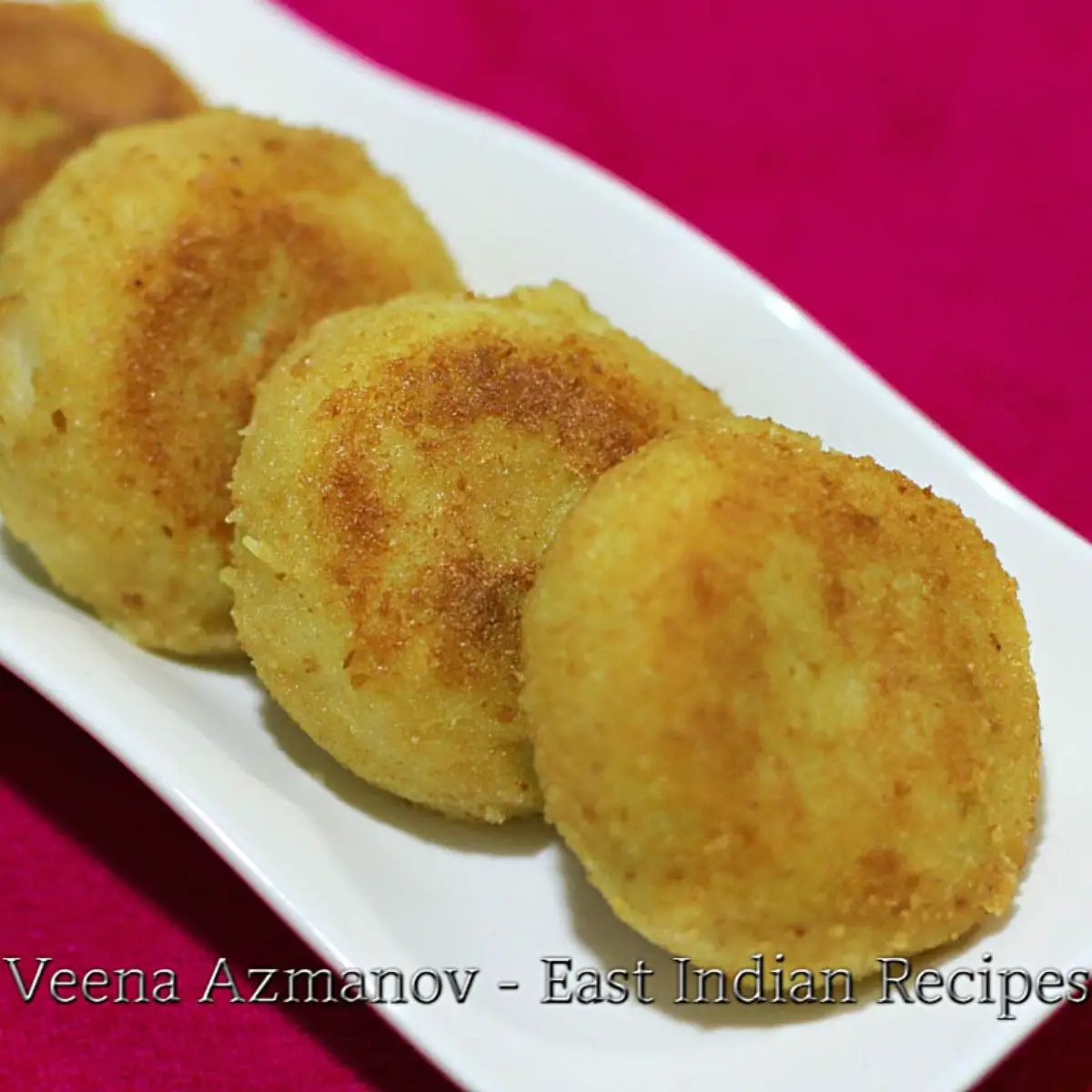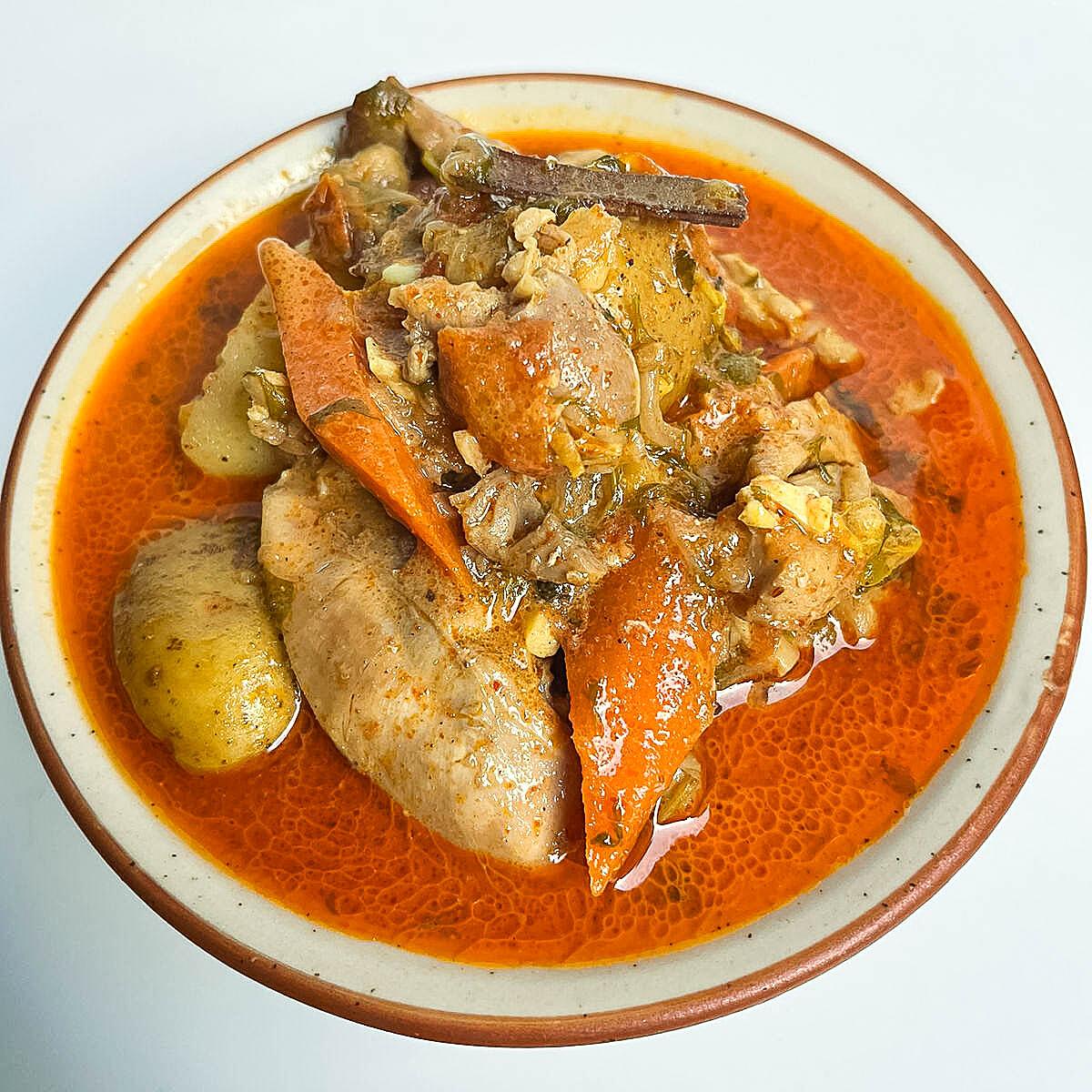Buckwheat Chicken Pilaf
Are you tired of serving up dry and flavorless buckwheat? Or worse, skipping the nutritious ingredients altogether? Have you tried adding chicken to your buckwheat Don’t give up on this healthy duo just yet. Today, I’ll teach you how to cook buckwheat with chicken you will love.
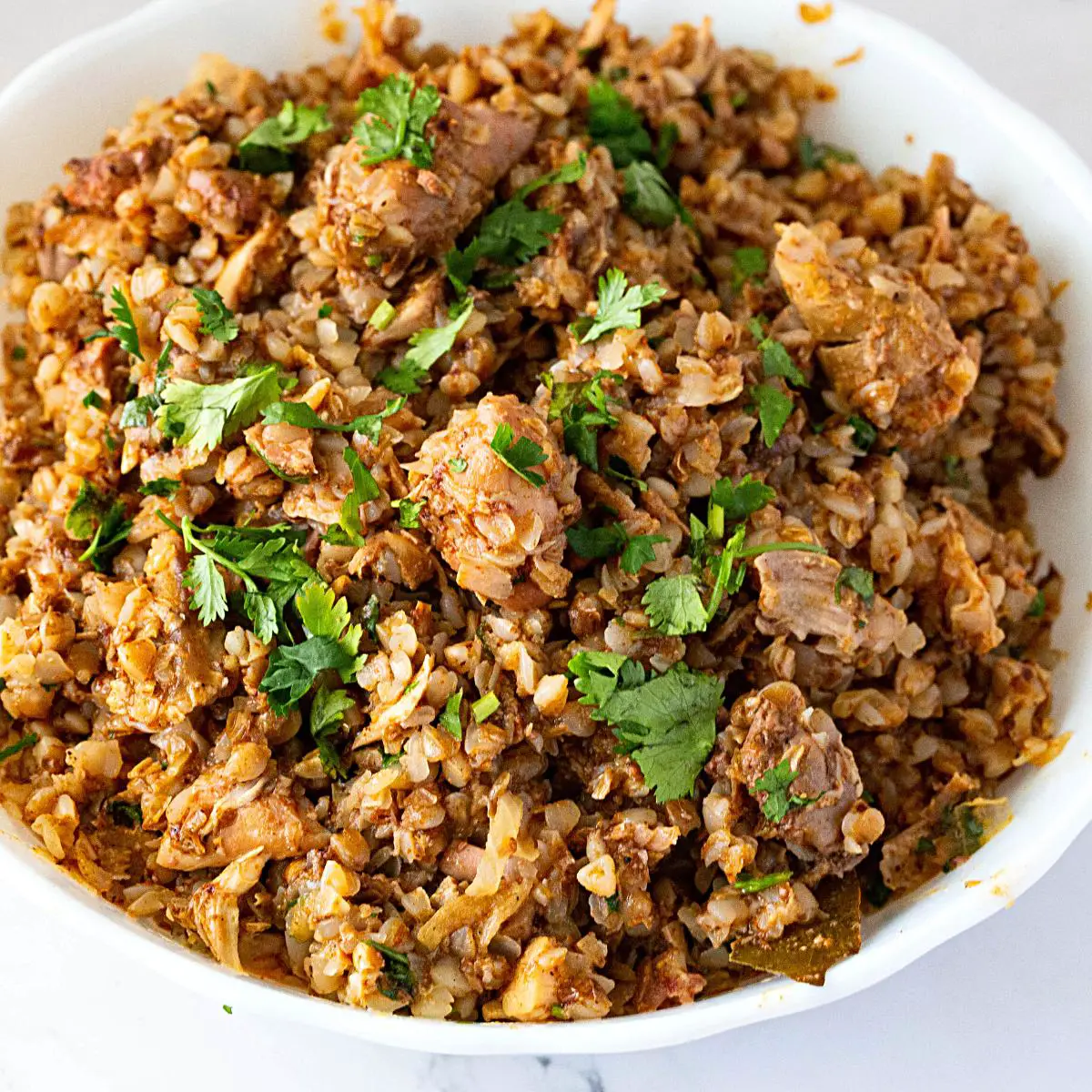
Health benefits of buckwheat (kuttu)
- If you’re looking for a healthy and nutritious meal, buckwheat should definitely be on your list.
- It is gluten-free and a great source of protein and fiber, making it an excellent choice for those following a vegetarian or vegan diet. Buckwheat contains essential amino acids, which help your body build and repair muscle tissue.
- Additionally, it is low in calories and carbohydrates, making it an excellent choice for weight loss or blood sugar control.
- Buckwheat also has a unique nutritional profile when compared to other grains. It’s rich in flavonoids, which are potent antioxidants that help protect your body against free radicals.
- Studies have shown that buckwheat can help reduce inflammation, lower blood pressure, and improve heart health. Finally, buckwheat contains a type of carbohydrate called resistant starch, which helps feed the good bacteria in your gut and may improve digestive health.
- All of these health benefits are just one more reason to incorporate buckwheat into your diet. And with our perfectly cooked buckwheat pilaf, you won’t have to sacrifice taste for nutrition.
Why make this buckwheat pilaf
- Buckwheat is a delicious and nutritious ingredient that should be a staple in any kitchen.
- The good news is that cooking with buckwheat doesn’t mean you have to sacrifice taste for nutrition. This perfectly cooked buckwheat pilaf with chicken recipe proves that this versatile grain can be both healthy and delicious.
- Most of the ingredients used in this recipe are simple pantry staples or easy to find.
- Also, cooking buckwheat is quite similar to cooking rice. In fact, you could tweak your favorite rice pilaf recipe using buckwheat instead.
- Plus, by choosing the right type of buckwheat, you can ensure that your dish turns out just the way you want it.
Remember, cooking is all about experimentation and taking risks. Don’t be afraid to try new things and adjust the recipe to your liking. With this recipe, plus my tips and tricks in mind, you’ll be able to create a delicious and perfectly cooked buckwheat dish every time.
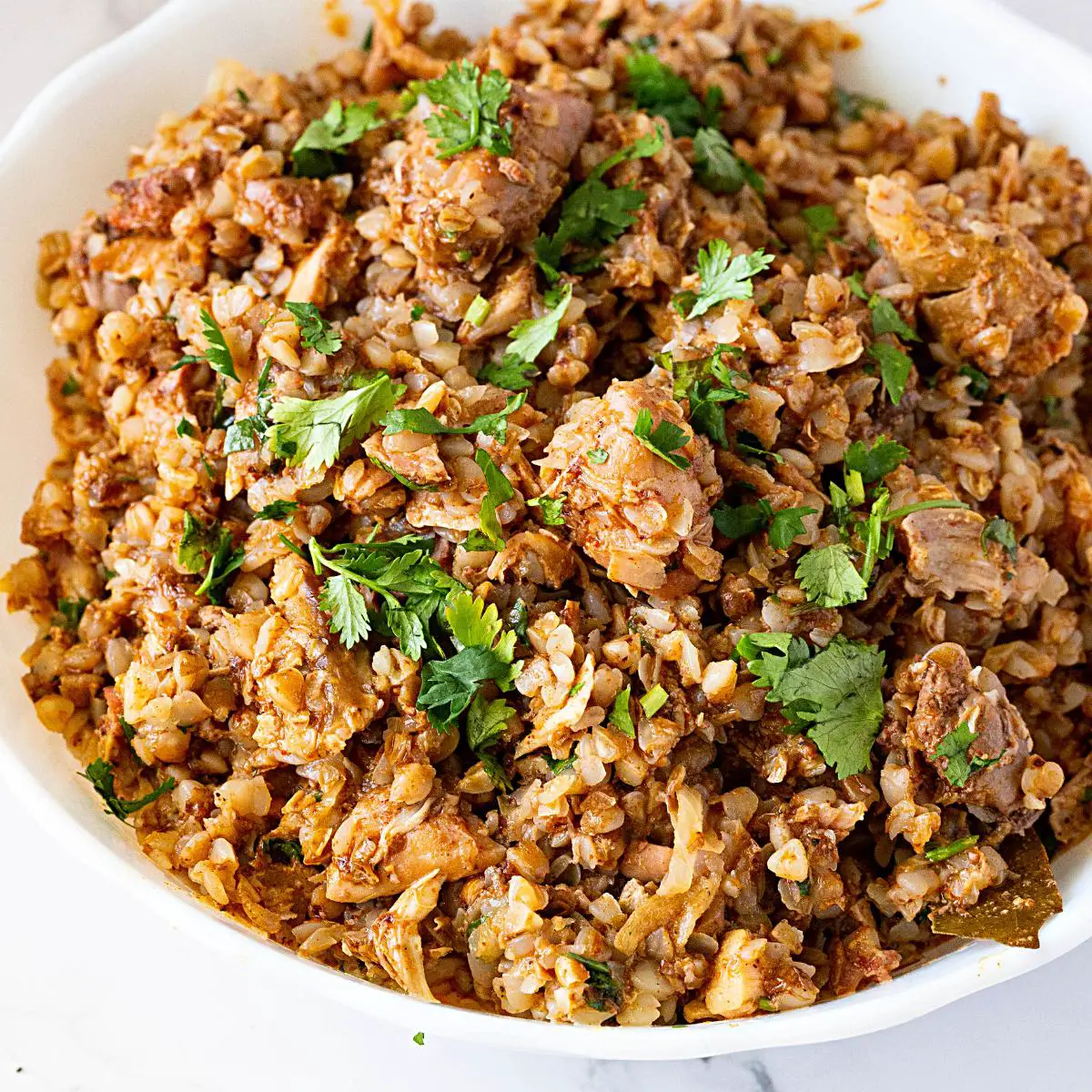
Choose the Right Buckwheat for your Recipe
When it comes to cooking with buckwheat, one important factor to consider is the type of buckwheat you’re using. While all buckwheat is inherently nutritious, there are a few different varieties that may be better suited for certain recipes. For example, if you’re making a dish that requires buckwheat to hold its shape, like a salad or pilaf, you’ll want to opt for whole buckwheat groats. On the other hand, if you’re using buckwheat as a flour substitute in baking, you’ll want to look for buckwheat flour.
Another thing to keep in mind is whether or not the buckwheat has been toasted. Toasted buckwheat, also known as kasha, has a nutty, slightly smoky flavor that can add depth to certain recipes. However, if you’re looking for a more neutral flavor profile, you may want to go for untoasted buckwheat.
Ultimately, the type of buckwheat you choose will depend on the recipe you’re making and your personal preferences. By taking the time to select the right type of buckwheat for your dish, you can ensure that your recipe turns out just how you want it to.
How to Prep Buckwheat for Cooking
To get perfectly cooked buckwheat, it’s important to prep it correctly before cooking. By taking the time to properly prep your buckwheat, you’ll ensure that it cooks evenly and turns out perfectly fluffy.
- Start by measuring out the amount of buckwheat you need and placing it in a fine-mesh strainer.
- Rinse the buckwheat under cool running water for a few minutes, swirling it around to ensure all the grains are clean.
- After rinsing, transfer the buckwheat to a pot and add enough water to cover it by about an inch. Let the buckwheat soak for at least 30 minutes, or up to 2 hours for optimal texture and flavor.
- Once the buckwheat has soaked, drain it well and rinse it once more under cool running water. Give it a final shake to remove any excess water, and it’s ready to be cooked.
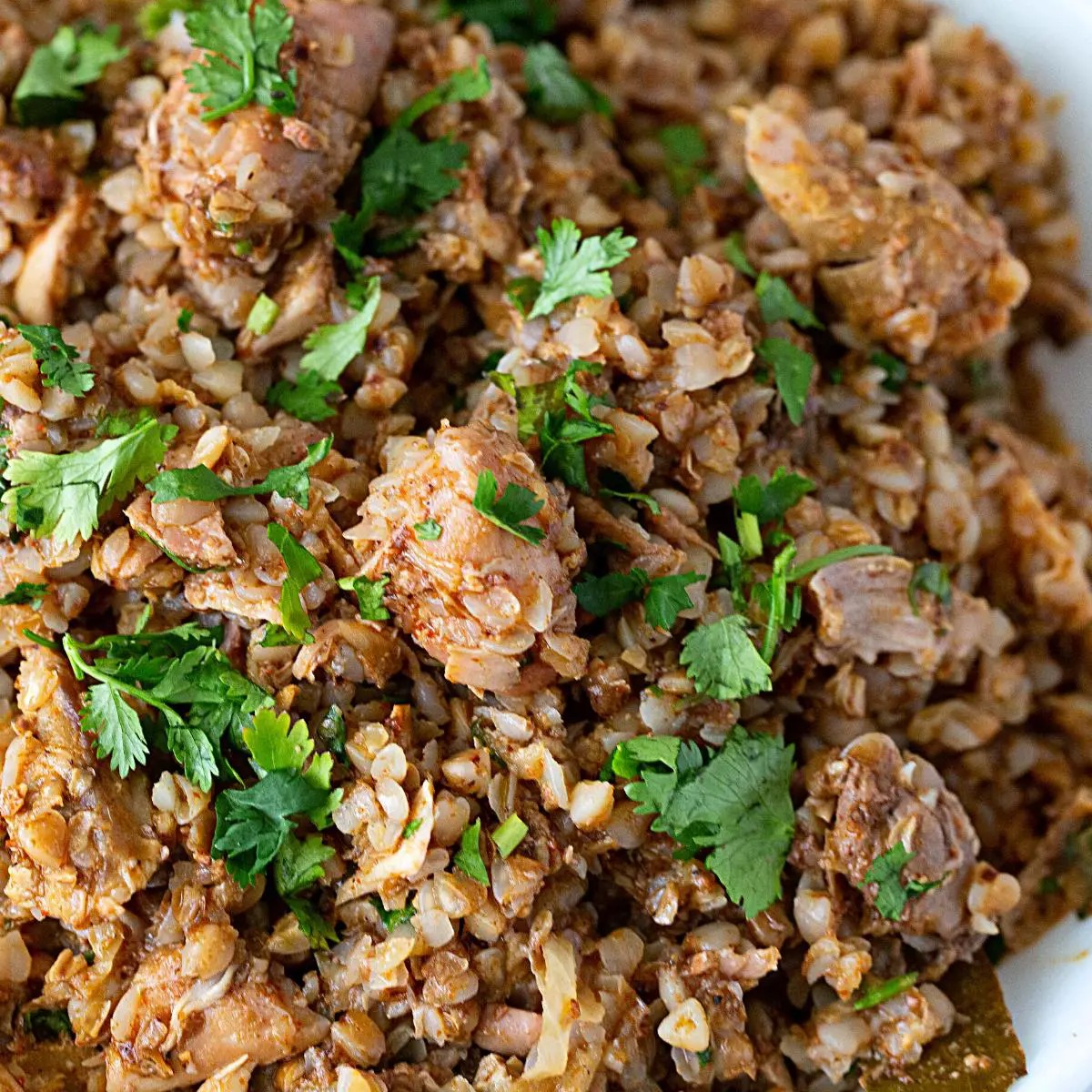
Bonus Tips for Perfecting Your Buckwheat
For those looking to take their buckwheat and chicken dish to the next level, here are some bonus tips to help you perfect your recipe:
- Use homemade chicken broth or stock for added depth of flavor. If you don’t have any on hand, store-bought is fine, but opt for low-sodium to avoid your dish becoming too salty.
- To keep the chicken juicy and tender, use boneless skinless chicken thighs or legs cut into pieces. Alternatively, don’t cut the chicken breast pieces too small. This ensures that it cooks evenly and doesn’t dry out.
- Experiment with different types of buckwheat. While traditional buckwheat groats work well, you can also try using buckwheat flour or soba noodles for a different texture and flavor.
- If you’re short on time, consider using a pressure cooker or instant pot to cook the chicken and buckwheat together in one pot. This will save you time and make cleanup a breeze.
By utilizing these bonus tips, you’ll be well on your way to creating the perfect buckwheat and chicken dish. However, even with the best intentions and preparation, things can still go wrong. If you encounter any issues, our next section on troubleshooting will provide you with some helpful solutions.,
Troubleshooting
Even the most experienced cooks can run into problems in the kitchen. Here are some common issues you may encounter when cooking buckwheat and chicken and how to troubleshoot them:
- Buckwheat is too mushy or clumpy – Make sure to rinse the buckwheat thoroughly before cooking and use the correct ratio of water to buckwheat. If it still turns out mushy, try cooking it for less time or spread it out on a baking sheet to cool and dry out a bit.
- Buckwheat and chicken are under seasoned – Don’t be afraid to add more seasoning! Taste the dish as you go and adjust as needed. If you’re not sure where to start, try adding a pinch of salt or a squeeze of lemon juice.
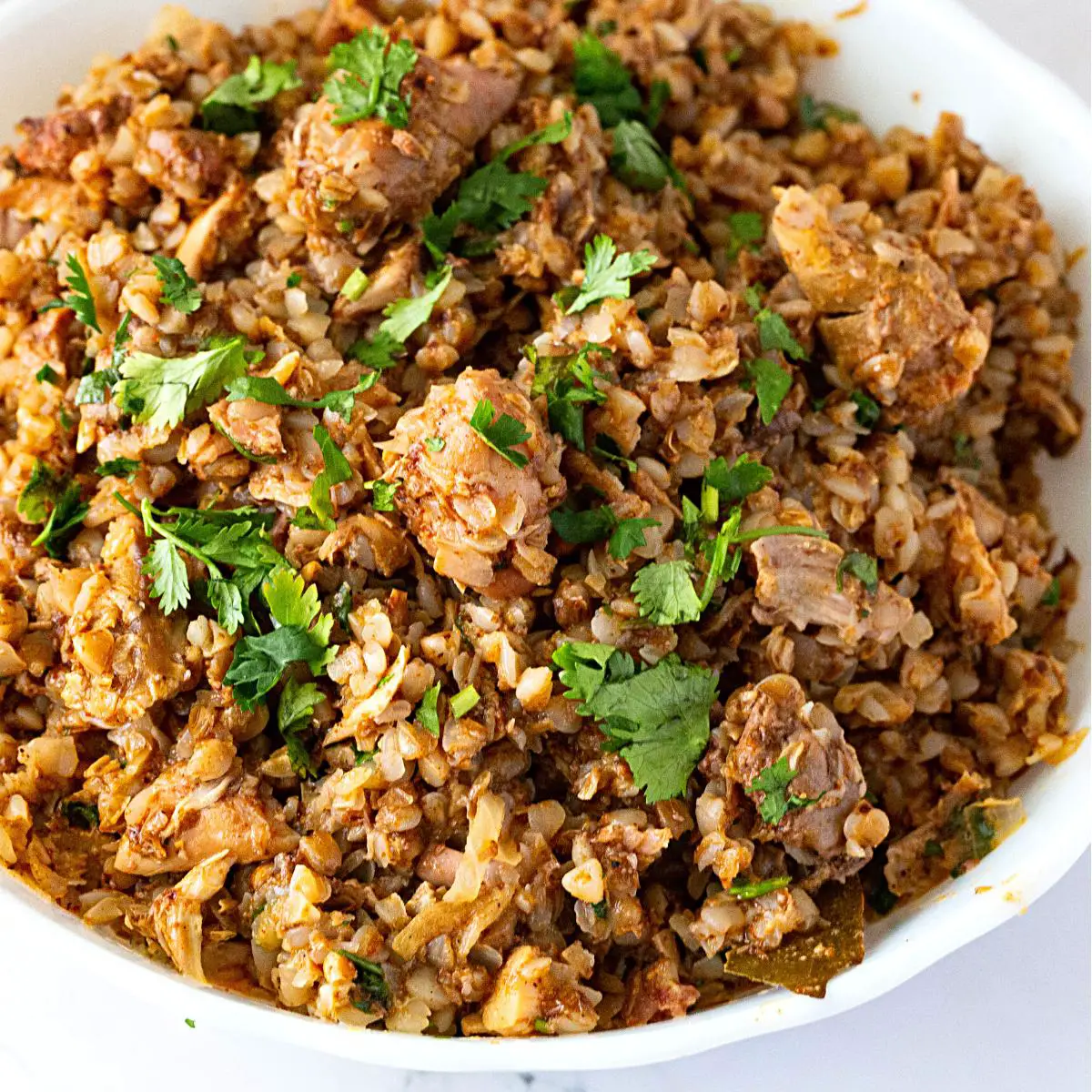
Absolutely! You can substitute buckwheat with other grains such as quinoa, brown rice or barley. Adjust the cooking time accordingly to the type of grain you are using.
The best way to ensure that the chicken is fully cooked is by using a meat thermometer. Insert the thermometer into the thickest part of the chicken. The internal temperature should reach 165°F (74°C) to ensure that it is fully cooked.
Yes, marinating the chicken overnight will result in an even more flavorful dish. Make sure to store the marinated chicken in the refrigerator in an airtight container until you are ready to cook it.
Yes, you can use boneless chicken breasts instead of thighs. However, keep in mind that boneless chicken breasts tend to cook faster than thighs. Adjust the cooking time accordingly to avoid overcooking the chicken.
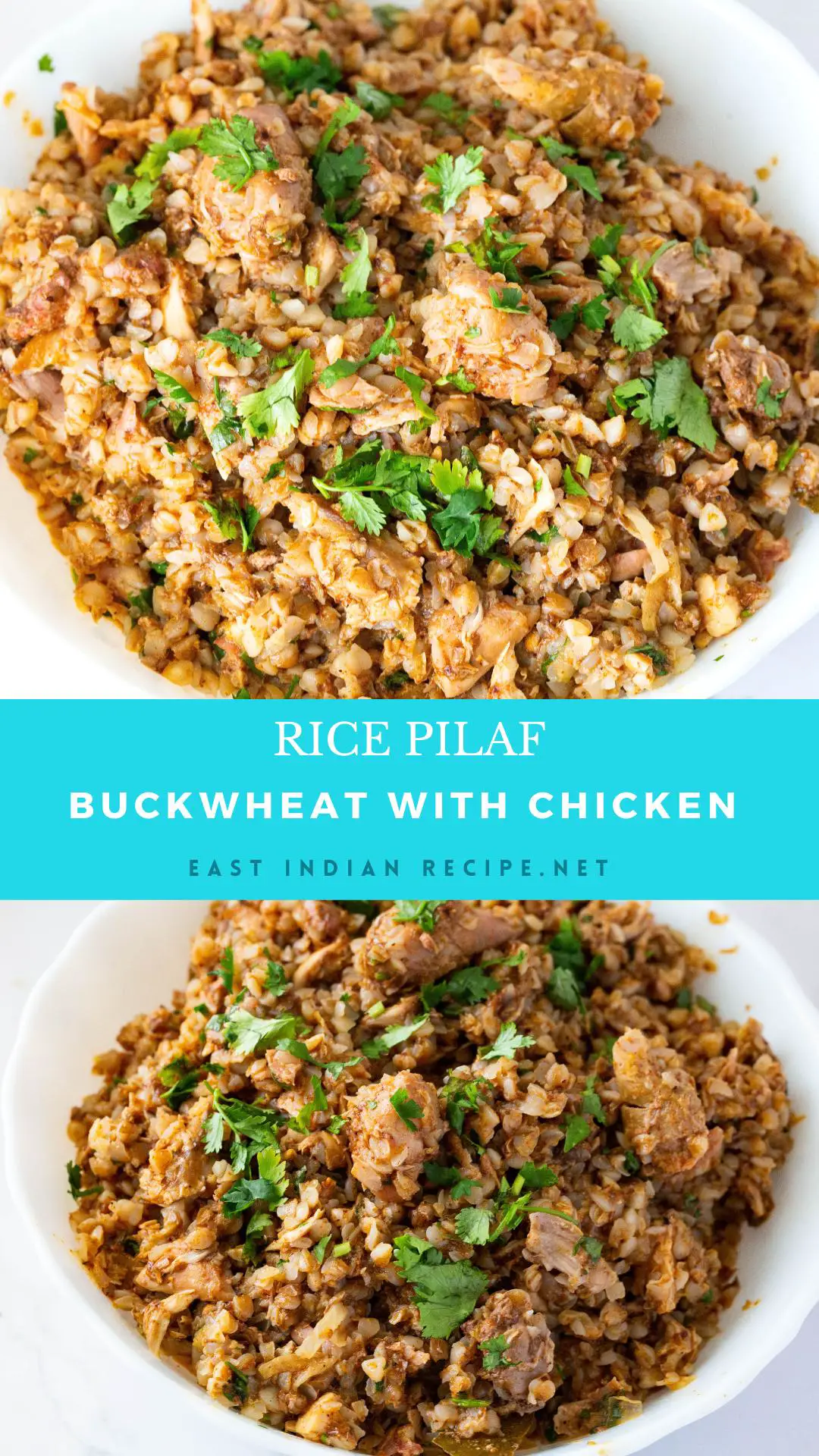
In conclusion, cooking buckwheat and chicken to perfection is easier than you think. By choosing the right ingredients, prepping them correctly, and using the stovetop method, you can create a delicious and nutritious dish that will impress anyone. Don’t be afraid to experiment with different seasonings and spices to make it your own. As the old saying goes, “the secret ingredient is always love”. So, put your heart into it and enjoy the results. Assemble the perfect buckwheat and chicken dish and share it with your loved ones. Spread the word about this healthy and tasty meal and see how it becomes a favorite in no time. “Good food is the foundation of genuine happiness.” -Auguste Escoffier.
Equipment /Tools
- Cutting Board
- Kitchen Knife
- Suate pan
- Wooden spoon
Ingredients
- 1 cup (1.50 cups) Buckwheat washed, soaked for 30 minutes then drained
- ½ lb (1 lb) Chicken thighs cut into pieces
- 2 tbsp Oil canola or olive
- 1 tbsp Ghee or butter (optional)
- 1 large Onion diced
- 2 large Garlic cloves minced
- 1 inch Fresh ginger grated
- 1 large Tomato chopped
- ½ cup Cilantro or parsley chopped
- 1 tsp Salt
- ½ tsp Black pepper power
- 2½ cups Stock or broth chicken or vegetable
- ¼ tsp Turmeric powder
- ½ tsp Coriander powder
- ½ tsp Cumin powder
- 4 green cardamom pods hari elichi
- 1 large Black cardamom pod kali elichi
- 1 3.-inch ( ) Cinnamon stick dalchini
- 5 cloves lavang
- 2 large Bay leaves
Instructions
- Rice – Wash the buckwheat under running water until the water runs clear. Cover the buckwheat with more water and soak for 30 minutes. Then drain and set aside. Pro tip – soaking the rice will help it become light and fluffy as well as cook evenly.
- Saute – In a saute pan over medium heat, add the oil and ghee/butter. Add the whole spices and saute for 30 seconds. Then, add the onions and saute until translucent. Followed by ginger and garlic. Saute another 30 seconds.2 tbsp Oil, 1 tbsp Ghee, 1 large Onion, 2 large Garlic cloves, 1 inch Fresh ginger, 4 green cardamom pods, 1 large Black cardamom pod, 1 3.-inch Cinnamon stick, 5 cloves, 2 large Bay leaves
- Spices – Next, add the chopped tomatoes and spices. Saute for two minutes on low heat adding a few tablespoons of water to prevent the spices from burning.1 large Tomato, ¼ tsp Turmeric powder, ½ tsp Coriander powder, ½ tsp Cumin powder
- Veggies – Add the chicken pieces. Saute for 2 to 3 minutes on medium-high heat until the chicken is no longer pink. Pro tip – cooking the chicken on medium-high will sear the meat and ensure the juices stay in prevent it from becoming chewy.½ lb Chicken thighs
- Rice – Add the buckwheat and sauté for 2 minutes more on medium heat. Then add stock /broth and season with salt and pepper. Add half the chopped cilantro/parsley and bring to a boil. Pro tip – if using commercial chicken stock or broth check for salt as these usually have salt added for preservation.½ cup Cilantro or parsley, 1 tsp Salt, ½ tsp Black pepper power, 2½ cups Stock or broth, 1 cup Buckwheat
- Cook – Once it comes to a boil lower the heat to the lowest settings and cover with a lid. Cook covered for 20 minutes. Pro tip – make sure the lid fits well and prevents loss of moisture otherwise the rice will dry out and the bottom may get stuck.
- Rest – After 20 minutes turn the heat off but, do not open the pan. Let the buckwheat rest for another 10 minutes. Then fluffy with a fork. Pro tip – resting helps absorb excess moisture. This will ensure. you have light and fluffy rice that is not sticky.
- Serve immediately once done
Recipe Notes
- Use homemade chicken broth or stock for added depth of flavor. If you don’t have any on hand, store-bought is fine, but opt for low-sodium to avoid your dish becoming too salty.
- To keep the chicken juicy and tender, use boneless skinless chicken thighs or legs cut into pieces. Alternatively, don’t cut the chicken breast pieces too small. This ensures that it cooks evenly and doesn’t dry out.
- Experiment with different types of buckwheat. While traditional buckwheat groats work well, you can also try using buckwheat flour or soba noodles for a different texture and flavor.
Other cooking methods
If you’re short on time, consider using a pressure cooker or instant pot to cook the chicken and buckwheat together in one pot. This will save you time and make cleanup a breeze.- Pressure cooker – Once you add all the ingredients, put the lid and whistle. Pressure cook for 1 whistle on medium heat.
- Instant pot – once you add all the ingredients, put the lid, seal the valve, and pressure cook on high for 5 minutes. Natural release for 3 minutes then manual release. Rest and fluffy rice.
About Videos – most recipes has two videos – a quick version in the post & longer detailed version on this recipe card. Please do subscribe to my channel if you like my videos
Nutrition Information
The nutrition information and metric conversion are calculated automatically. I cannot guarantee its accuracy. If this data is important to you please verify with your trusted nutrition calculator. Thank you
